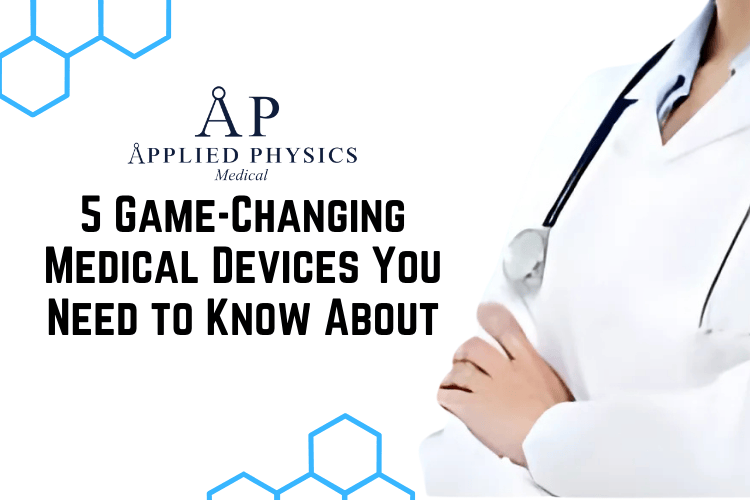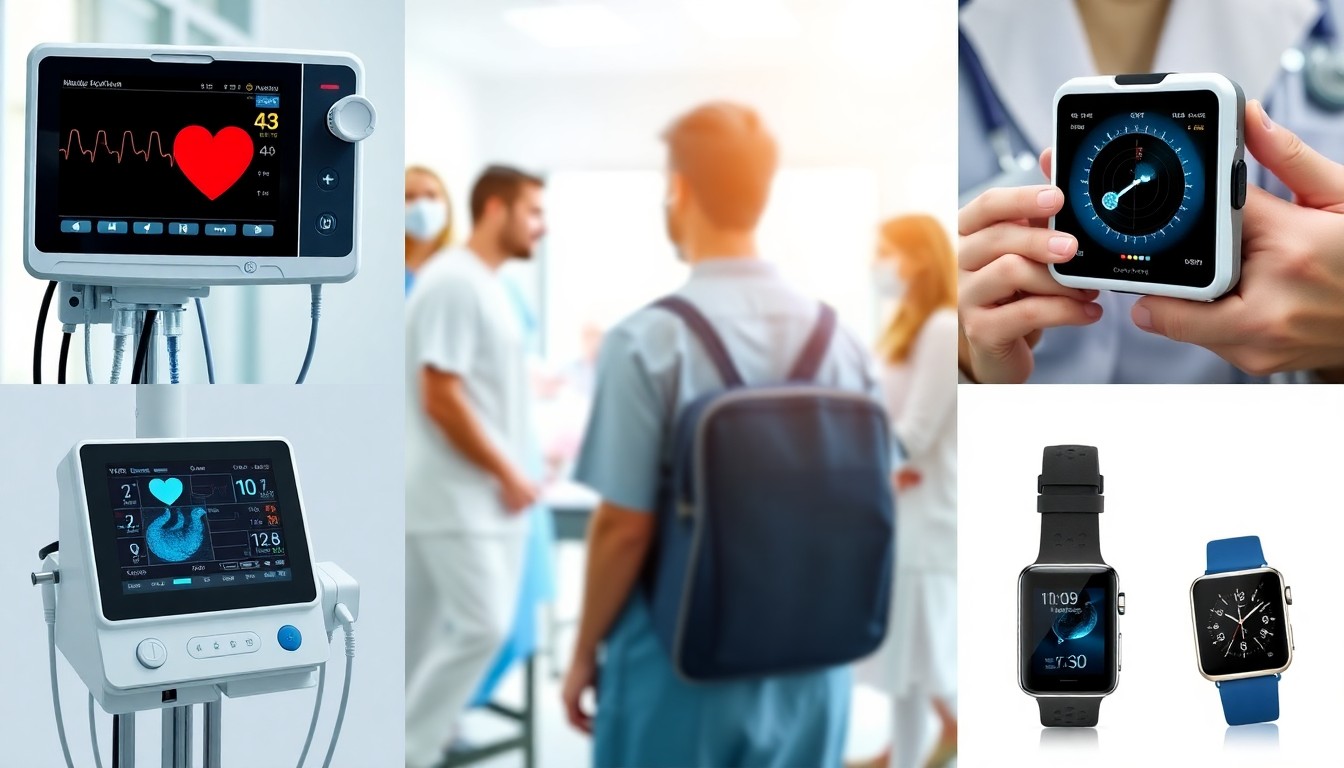Introduction
In the ever-evolving landscape of healthcare, medical devices play a pivotal role in enhancing patient care and treatment outcomes. These devices range from simple tools, such as thermometers, to complex machinery like MRI machines, each designed to improve diagnosis, treatment, and monitoring of various health conditions. The advent of innovative medical devices has not only transformed traditional practices but has also paved the way for more personalized and efficient healthcare solutions.
As technology continues to advance, the integration of these devices into clinical settings becomes increasingly vital. The significance of game-changing medical devices cannot be overstated. They have the potential to save lives, reduce recovery times, and improve the quality of life for patients suffering from chronic illnesses.
With the rise of telemedicine and remote monitoring, medical devices are becoming more accessible, allowing healthcare providers to deliver care beyond the confines of traditional settings. This shift is particularly important in rural or underserved areas where access to healthcare resources may be limited. As we delve deeper into the impact of these devices, it becomes clear that they are not just tools but essential components of modern healthcare.
Key Takeaways
- Medical devices are revolutionizing healthcare by improving patient outcomes and revolutionizing treatment.
- Advancements in medical technology have led to the development of game-changing devices that are making a significant impact on healthcare.
- It is important to stay informed about medical device innovations to understand their impact on healthcare and patient outcomes.
- The future of medical devices holds great potential for further advancements in improving healthcare and patient treatment.
- Medical devices are playing a crucial role in shaping the future of healthcare and it is important to recognize their significance in improving patient outcomes.
The Impact of Medical Devices on Healthcare
The impact of medical devices on healthcare is profound and multifaceted. They facilitate early diagnosis, enable timely interventions, and enhance the overall efficiency of healthcare systems. For instance, wearable devices that monitor vital signs in real time allow for continuous patient surveillance, which can lead to quicker responses in emergencies.
This capability is particularly crucial for patients with chronic conditions such as diabetes or heart disease, where timely adjustments to treatment can significantly alter outcomes. Moreover, medical devices contribute to the democratization of healthcare by making advanced diagnostic tools available to a broader population. Innovations such as portable ultrasound machines and handheld blood analyzers are breaking down barriers that once limited access to high-quality medical care.
These devices empower healthcare professionals to make informed decisions at the point of care, ultimately leading to better patient management and reduced hospital admissions. The ripple effect of these advancements is evident in improved health metrics across various populations.
Cutting-Edge Medical Devices Revolutionizing Treatment
Among the myriad medical devices available today, several cutting-edge innovations stand out for their transformative potential in treatment protocols. One such device is the robotic surgical system, which enhances precision during complex procedures. Surgeons can perform minimally invasive surgeries with greater accuracy, resulting in reduced recovery times and less postoperative pain for patients.
This technology exemplifies how robotics can augment human capabilities in the operating room. Another revolutionary device is the implantable cardioverter-defibrillator (ICD), which monitors heart rhythms and delivers shocks when necessary to prevent sudden cardiac arrest. The development of this device has significantly improved survival rates for patients at risk of life-threatening arrhythmias.
Additionally, advancements in telehealth technologies have led to the creation of remote monitoring devices that allow patients to manage their health from home while remaining connected to their healthcare providers. These innovations not only enhance treatment efficacy but also empower patients to take an active role in their health management.
Advancements in Medical Technology: 5 Game-Changing Devices
| Device | Function | Impact |
|---|---|---|
| Pacemakers | Regulate heart rhythm | Improves heart function and quality of life |
| Robotic Surgery Systems | Precision surgery with minimal invasiveness | Reduced recovery time and complications |
| Artificial Organs | Replace or support natural organs | Extends life expectancy and improves organ function |
| 3D Printing in Medicine | Create customized implants and prosthetics | Enhances patient-specific treatment and outcomes |
| Smart Inhalers | Track and improve inhaler use for respiratory conditions | Optimizes medication delivery and management |
Several specific medical devices exemplify the advancements in technology that are reshaping healthcare. First on the list is the continuous glucose monitor (CGM), which provides real-time glucose readings for individuals with diabetes. This device allows for better glycemic control and reduces the risk of complications associated with fluctuating blood sugar levels.
By providing immediate feedback, CGMs enable patients to make informed dietary and lifestyle choices. Next is the 3D printer, which has revolutionized prosthetics and organ modeling. Custom prosthetics can now be created with precision tailored to individual patients, improving comfort and functionality.
Furthermore, 3D-printed organ models assist surgeons in planning complex procedures by providing a tangible representation of a patient’s anatomy. Another notable device is the smart inhaler, which tracks medication usage and provides reminders for asthma or COPD patients, ensuring adherence to treatment plans. The fourth device is the wearable ECG monitor, which continuously tracks heart activity and alerts users to irregularities that may require medical attention.
This proactive approach to heart health can lead to early detection of conditions such as atrial fibrillation. Lastly, the use of artificial intelligence (AI) in diagnostic imaging has transformed radiology by enhancing image analysis and reducing interpretation errors. These advancements illustrate how technology is not only improving existing treatments but also creating new possibilities for patient care.
How Medical Devices are Improving Patient Outcomes
The integration of advanced medical devices into healthcare practices has led to significant improvements in patient outcomes across various domains. For instance, remote monitoring devices have enabled healthcare providers to track patients’ health metrics outside traditional clinical settings. This capability allows for timely interventions when abnormalities are detected, reducing hospital readmissions and enhancing overall patient safety.
Additionally, the use of telemedicine platforms equipped with diagnostic tools has expanded access to specialists for patients in remote areas. This accessibility ensures that individuals receive expert care without the burden of travel, ultimately leading to better management of chronic conditions. Furthermore, patient engagement technologies, such as mobile health applications, empower individuals to take charge of their health by providing educational resources and tracking their progress toward health goals.
The Future of Medical Devices and Healthcare
Looking ahead, the future of medical devices promises even greater innovations that will further enhance healthcare delivery. The integration of artificial intelligence and machine learning into medical devices is expected to streamline processes and improve diagnostic accuracy. For example, AI algorithms can analyze vast amounts of data from imaging studies to identify patterns that may be missed by human eyes, leading to earlier detection of diseases such as cancer.
Moreover, advancements in biotechnology may lead to the development of smart implants that can monitor physiological changes and release medications as needed. These devices could revolutionize treatment for chronic conditions by providing personalized therapy based on real-time data. As regulatory frameworks evolve to accommodate these innovations, the potential for improved patient outcomes will continue to expand.
The Importance of Staying Informed about Medical Device Innovations
Staying informed about medical device innovations is crucial for healthcare professionals and patients alike. As technology continues to advance rapidly, understanding the capabilities and applications of new devices can lead to better decision-making in clinical practice and improved health outcomes for patients. Awareness of these advancements fosters a culture of continuous learning and adaptation within the healthcare community.
Furthermore, as patients become more knowledgeable about available medical technologies, they can engage more effectively with their healthcare providers in discussions about treatment options. This collaborative approach enhances patient satisfaction and promotes adherence to treatment plans. Ultimately, embracing the evolution of medical devices is essential for navigating the future landscape of healthcare effectively.
Conclusion
In the rapidly evolving field of medicine, innovative devices are transforming patient care and treatment outcomes. From advanced surgical tools to wearable health monitors, these technologies enhance precision and accessibility in healthcare. Staying informed about these game-changing devices is essential for both medical professionals and patients alike. Embracing these advancements promises a brighter future for medical practices and improved quality of life.


